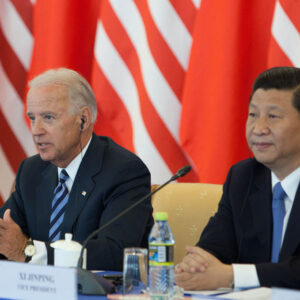Despite decades of broken promises and outright lies from China, much of America’s political elite continue to believe that “bilateral engagement” with Beijing will somehow, eventually yield a positive outcome. But in reality, Beijing perennially uses diplomatic talks to simply delay any U.S. action.
And so, enough is enough. It’s time for Washington to act.
U.S. Trade Representative Katherine Tai just drew a similar conclusion in a report to Congress, explaining that the rules of the World Trade Organization (WTO) cannot “effectively discipline many of China’s most harmful policies and practices.” Tai believes this is because “China has not moved to embrace the market-oriented principles on which the WTO and its rules are based.” Her dismissal of the WTO’s effectiveness—coming after similar concerns from the Trump administration—shows that neither party in Washington trusts the Geneva-based organization.
Concerns over China are also heightened now that Beijing has failed to meet the terms of a “Phase One” agreement negotiated by the Trump administration. The 2020 agreement had halted further implementation of “Section 301” tariffs intended to address China’s state-sponsored intellectual property theft. In exchange for a pause in the tariffs, Beijing had agreed to increase its purchases of U.S. exports. However, China purchased only 57 percent of the goods it committed to buying.
Essentially, Beijing reneged on buying roughly $200 billion worth of U.S. exports. And that gave Beijing the better end of the deal since the Phase One agreement had forestalled tariffs on $300 billion worth of China’s exports.
The collapse of Phase One is simply one more policy failure going back more than 20 years—to the Clinton administration’s original push for China’s entry into the WTO. In 2000, President Bill Clinton had promised that China would soon be “lowering the barriers that protect state-owned industries.” But that never happened.
Instead, Beijing embarked on a massive program of state capitalism that continually funnels billions of dollars in subsidies to state-owned enterprises. The Chinese government also “loans” money to state-owned companies—with no real expectation of repayment. The Chinese steel industry, for example, now owes at least $484 billion in outstanding loans that will never be repaid.
Beijing also continues to impose onerous market barriers, including forced technology transfers that cost U.S. companies more than $350 billion annually. Chinese companies have also stolen some of America’s most advanced proprietary technologies; it’s estimated that 20 percent of China’s wind turbines contain stolen U.S. software. This is simply business as usual for Beijing—what a federal investigation revealed in 2018 as China’s ongoing efforts to steal key U.S. assets.
Such amoral tactics are standard policy for Beijing’s aggressive, authoritarian regime. And that includes forced labor from more than 1 million Uyghurs and other ethnic minorities that have been “disappeared” into a vast network of “reeducation camps” in western China. It’s estimated that at least 80,000 Uyghurs have been transferred to slave labor in factories throughout China.
China’s industrial rise has also come on the back of planet-altering environmental practices such as the massive brown cloud of soot and debris that drifts east from mainland China each year. Additionally, factories in China emit roughly 20,000 tons of ozone-depleting carbon tetrachloride annually, in violation of international agreement.
For the United States, the conclusion should be obvious: Bilateral engagement with China has failed—particularly when Beijing has now insulted President Joe Biden by failing to honor its Phase One commitments.
Because the WTO is toothless, and bilateral engagement doesn’t work, the Biden administration must now respond forcefully. Since China has breached the Phase One agreement, the U.S. is no longer obligated to delay its Section 301 tariffs. Biden should immediately impose the “List Four” tariffs planned before the agreement was reached.
Congress should also pass the America COMPETES Act. That legislation would reform some of America’s tariff programs while also closing import loopholes and strengthening both anti-dumping and countervailing duties.
Washington must finally grasp the full extent of China’s win-at-all-costs strategy—and respond while there’s still time. Neither bilateral consultations nor the WTO can provide a “level playing field.” In order to correct the mistakes of the past 20 years, the United States must finally hit back, rather than tolerate China’s ongoing, abusive behavior.

